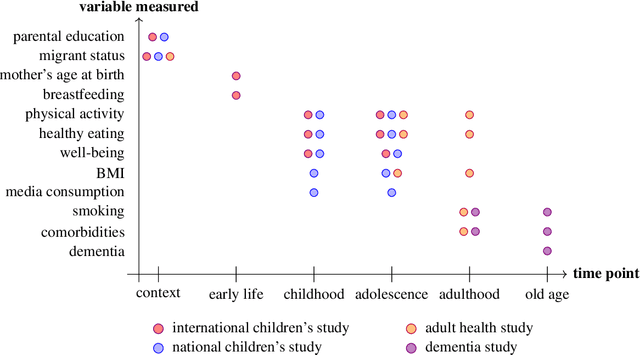Christine W. Bang
Constraint-based causal discovery with tiered background knowledge and latent variables in single or overlapping datasets
Mar 27, 2025



Abstract:In this paper we consider the use of tiered background knowledge within constraint based causal discovery. Our focus is on settings relaxing causal sufficiency, i.e. allowing for latent variables which may arise because relevant information could not be measured at all, or not jointly, as in the case of multiple overlapping datasets. We first present novel insights into the properties of the 'tiered FCI' (tFCI) algorithm. Building on this, we introduce a new extension of the IOD (integrating overlapping datasets) algorithm incorporating tiered background knowledge, the 'tiered IOD' (tIOD) algorithm. We show that under full usage of the tiered background knowledge tFCI and tIOD are sound, while simple versions of the tIOD and tFCI are sound and complete. We further show that the tIOD algorithm can often be expected to be considerably more efficient and informative than the IOD algorithm even beyond the obvious restriction of the Markov equivalence classes. We provide a formal result on the conditions for this gain in efficiency and informativeness. Our results are accompanied by a series of examples illustrating the exact role and usefulness of tiered background knowledge.
Do we become wiser with time? On causal equivalence with tiered background knowledge
Jun 02, 2023



Abstract:Equivalence classes of DAGs (represented by CPDAGs) may be too large to provide useful causal information. Here, we address incorporating tiered background knowledge yielding restricted equivalence classes represented by 'tiered MPDAGs'. Tiered knowledge leads to considerable gains in informativeness and computational efficiency: We show that construction of tiered MPDAGs only requires application of Meek's 1st rule, and that tiered MPDAGs (unlike general MPDAGs) are chain graphs with chordal components. This entails simplifications e.g. of determining valid adjustment sets for causal effect estimation. Further, we characterise when one tiered ordering is more informative than another, providing insights into useful aspects of background knowledge.
 Add to Chrome
Add to Chrome Add to Firefox
Add to Firefox Add to Edge
Add to Edge